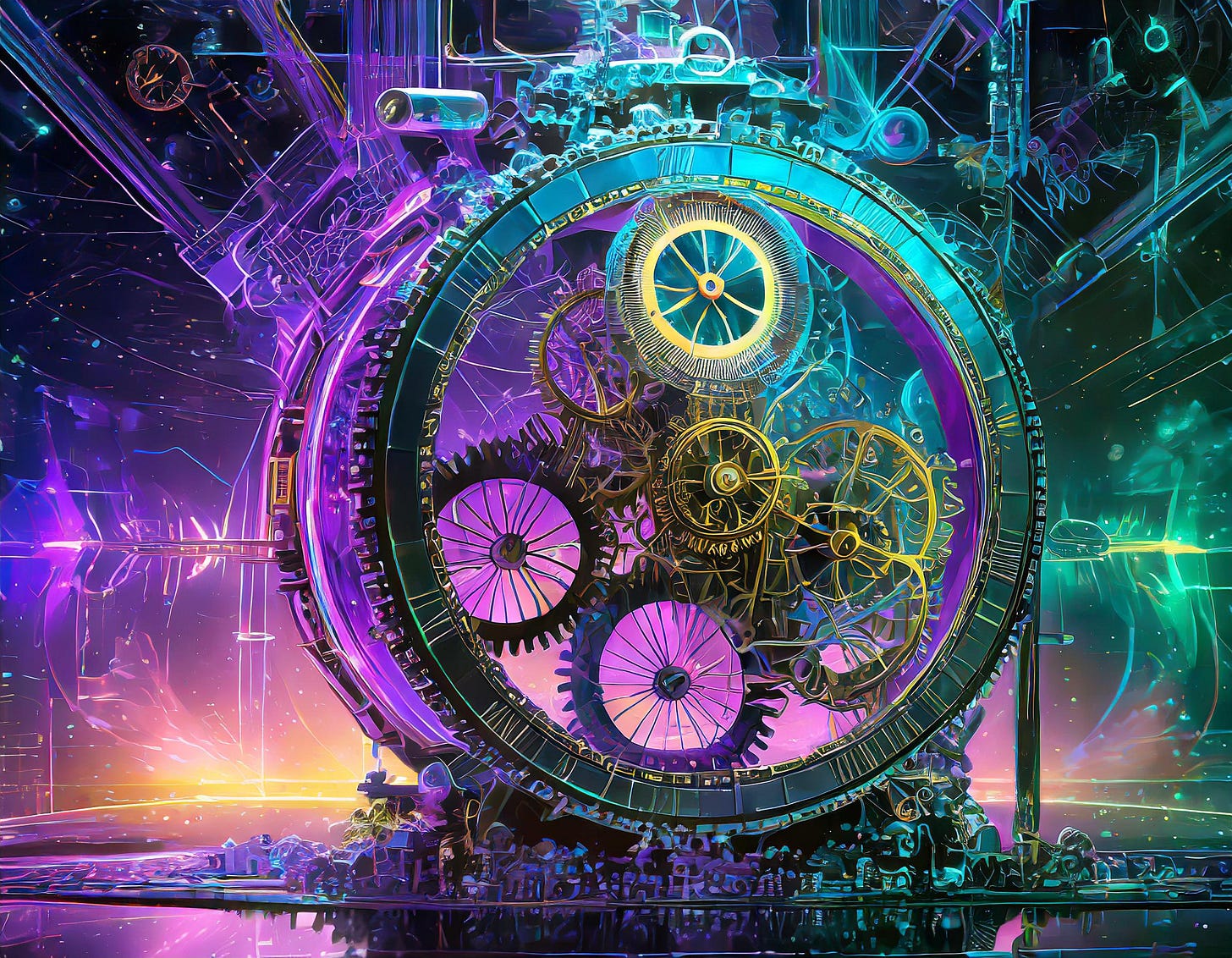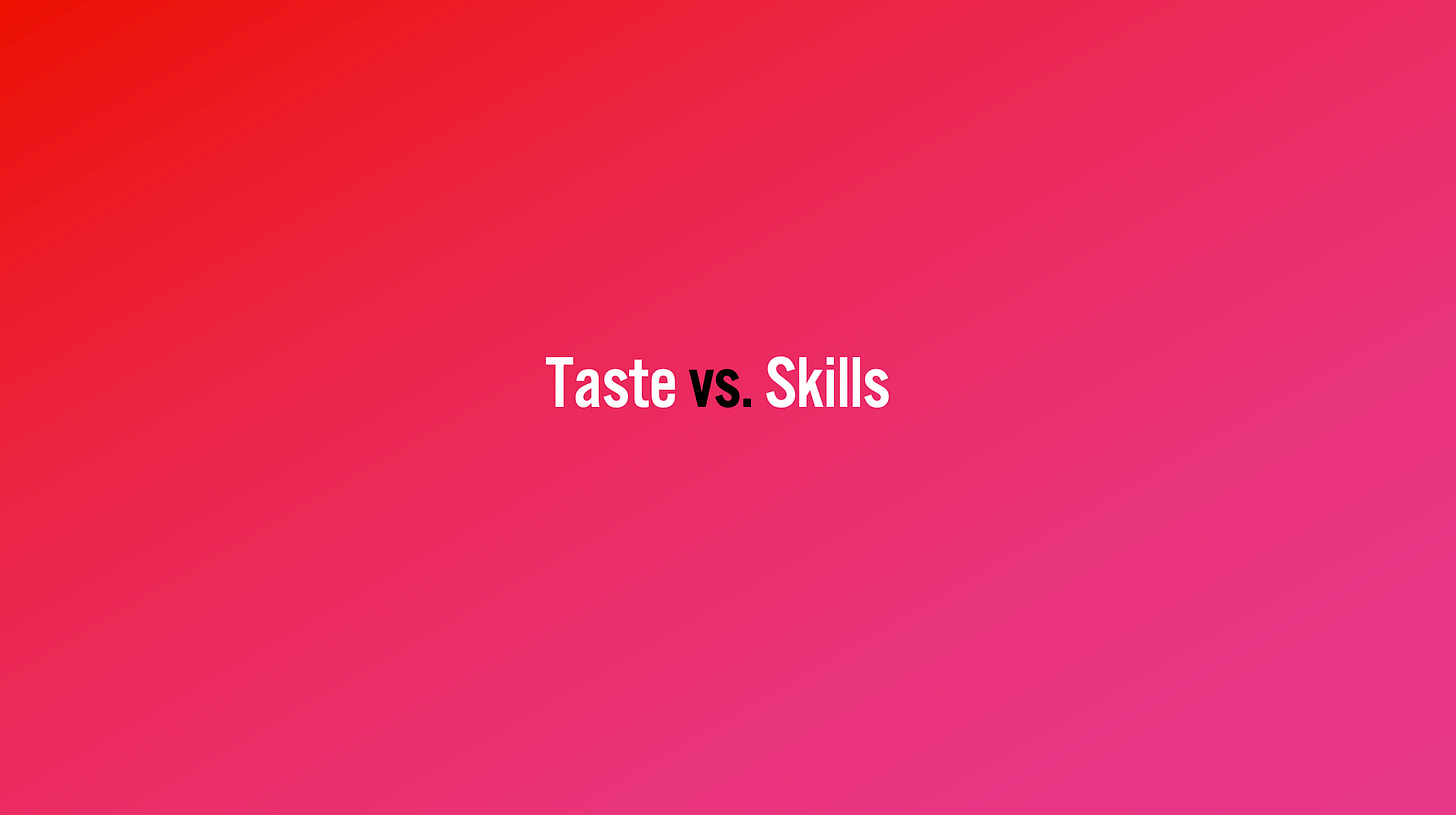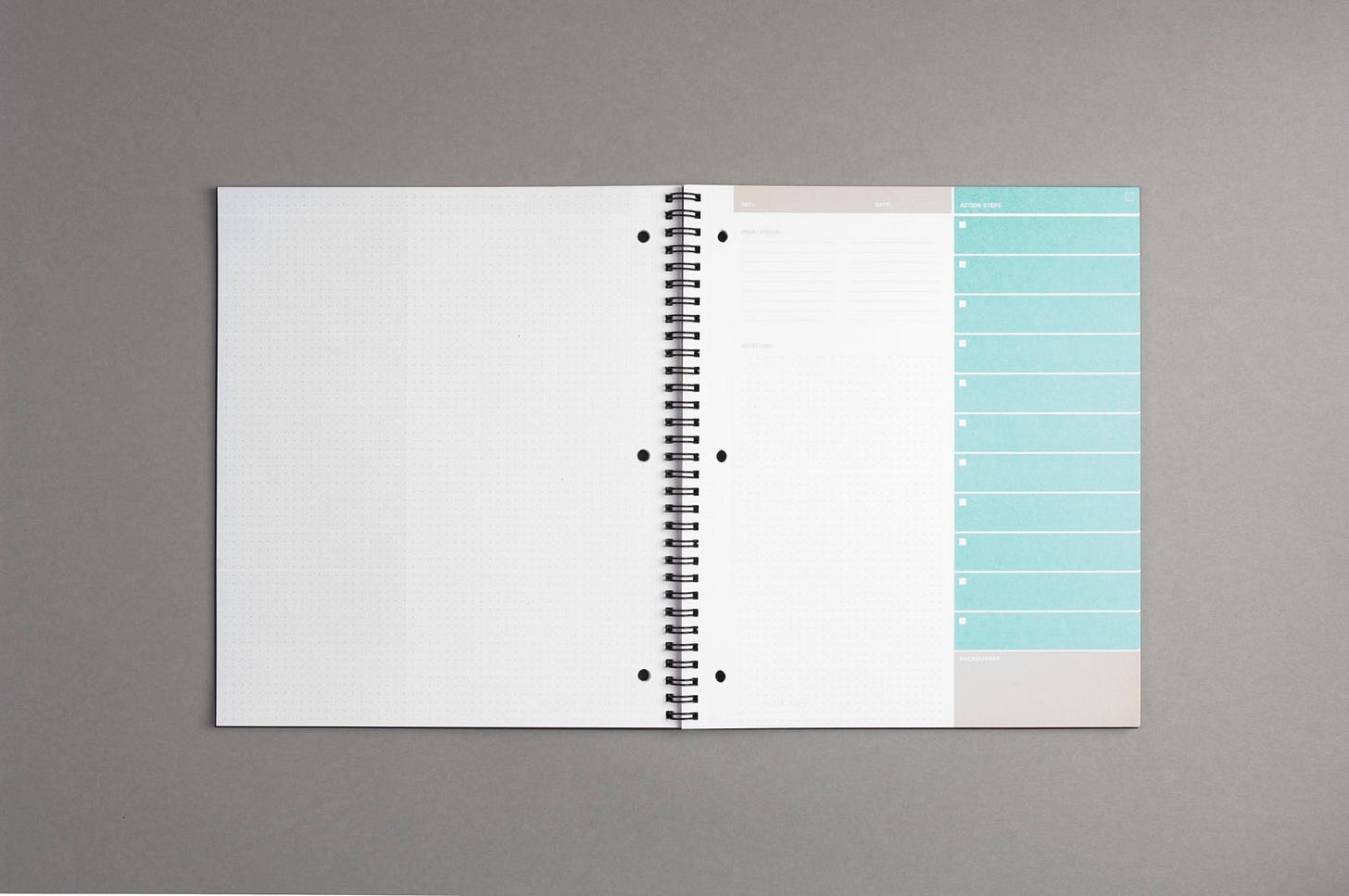The Era of Abstraction & New Creative Tensions
Let’s talk about creative tensions and the implications of interfaces that abstract away the sources of news, commerce, and information.
Edition #16 of Implications.
This edition explores implications around: (1) the era of abstraction - the massive implications of a world where reasoning, summarization, and automation abstract us away from the sources of everything, (2) rising tensions around creativity in the age of AI, and (3) some surprises at the end, as always.
If you’re new, here’s the rundown on what to expect. This ~monthly analysis is written for founders + investors I work with, colleagues, and a select group of subscribers. I aim for quality, density, and provocation over frequency and trendiness. We don’t cover news; we explore the implications of what’s happening. My goal: socialize edges that may someday become the center, help all of us connect dots, and keep me on my toes.
If you missed the big annual analysis or more recent editions of Implications, check out recent analysis and archives here. A few highlights include lifespan vs. healthspan vs. joyspan, strange way AI disrupts business models, and open-sourced R&D. OK, now let’s dive in…
The era of abstraction.
When you zoom out and look at the impact of LLMs (large language models) and the roadmap ahead (especially multi-modal LLMs), it is clear that natural language and agent-assisted reasoning and automations will summarize most aspects of work and life and cover most workflows on our behalf. You want to read the news without the spin, clickbait, and ads? AI will summarize hundreds of articles on today’s topics of interest and give you the highlights (there’s already one startup I am super excited about in this space). You want to plan a trip? AI will propose a start-to-finish itinerary based on your interests (and abstracting away all the vendors, traveler reviews, and other elements that you’d normally engage with). Common in these two examples: abstraction. Over the coming years, we will go to the sources of everything less and less as the perfect summary, answer, or solution is generated and surfaced for us by trusted AI tools. Let’s explore the implications for the news industry, every website, and software as we know it.
Every source plagued (read: monetized) by bias will be under siege. Whether it’s Yelp for reviews, your favorite news site, your favorite travel magazine, or the everyday Google search, these sources of information are powered by bias. They either monetize by selling ads (designed and inserted to bias our purchase decisions) or they sell actual services ( and bias their content is designed towards what they sell). First-hand knowledge and time spent researching to find the best and most economical choice has always been the greatest antidote to being influenced by marketing, but such work is hard and time intensive for everyday consumers. Enter AI. I think we are all vastly underestimating the impact of a deeply trusted objective AI-powered agent that does all the research, summarizes everything we need to know, and suggests the information or decision that is best for us. We will soon learn that the source of anything (news, products, services) is often more biased than the AI summarizing every source for us.
What happens when AI browses the web for us? I’ve been experiencing this sensation first-hand as an early beta user (and seed investor) in the Arc Browser, from The Browser Company of New York (what a killer company name). In Arc, when you’re trying to find something on a site, you engage an Anthropic-powered AI agent that tries to understand exactly what you’re looking for (and why), rather than the classic “find a word on a page” that we’re used to. And the company has publicly teased the future of browsing and search in Arc, which is more akin to pulling a summary of what you’re searching for from many sources as opposed to the classic Google approach of giving you a smattering of results from different sources (many of which are paid placements).
Abstraction Hacking becomes the new SEO: In an edition last year, I explored the idea of “knowledge hacking” that would become a massive industry conceived to bias the knowledge of LLMs and the results we get for every inquiry we make in the era of AI.
“Given the scraping of Wikipedia and scores of blog posts to help train common LLMs (Large Language Models), I anticipate a growing and sophisticated effort to try and trick these models with highly choreographed edits and campaigns that literally “hack” the knowledge and reasoning of AI. Similarly, you can expect a whole legion of “training hackers” to emerge who infiltrate commonly scraped sources of training data to influence the standing of brands, people, and facts - SEO for the age of AI. For this reason, the provenance of models and generated assets of all kinds will matter tremendously (and one reason my team is so focused on the Content Authenticity Initiative). This growing field of “Knowledge Hacking” will spawn new countermeasures in the way LLMs scrape the web and validate the information used in training. Similarly, I expect this to happen with our own personal history as we rely on private models running locally on our devices that help us remember our own past, things we did or said, etc. Perhaps we’ll refer to “Personal History Hacks” when someone tries to infiltrate our personal memory AI with false occurrences that influence the outcome of your searches of your own past. (sorry, too dystopian!?)”
Suffice to say, we must be wary of the models being used in the era of abstraction. We must remember that the new “trust, but verify” is “verify, then trust.”
Who wins in the era of abstraction? Many of my VC friends are investing in startups building novel interfaces that are optimized for abstracted experiences. A few examples: empowering any stakeholder of marketing or finance in a big company to query analytics using natural language as opposed to tasking a data analyst, creating new consumer shopping experiences, innovating new approaches to coaching, psychology, and the list goes on. But most VC’s fail to understand the mature state and ubiquity of the APIs that all of these startups are leveraging. And more importantly, they fail to realize — given the ubiquity of these underlying capabilities and incumbent advantages building AI services leveraging proprietary data — that the ultimate winner in the age of abstraction will be the designer (and companies that empower design). Yes, the quality and empowerment of designers in every company - from startups to the world’s largest enterprises - will determine success in the age of abstraction. Why? The modern API-first internet is a giant game of slap-a-hand, where the interface on the top wins. The best integrations into existing workflows (unlocked by designers) and the novel and transformative interfaces (discovered by designers) will sit on top and become the surfaces we ultimately choose to engage with. For companies with a shortage of design talent, they will lose market share to startups that value design. But in this age, unless you’re building the core models, design advantages will outperform tech advantages. The losers will regret falling behind in design more than lamenting their inferior technology. If you’re a startup, your best chance is to leverage design to build transformative interfaces in a market of competitors who cannot.
Tensions of Creativity in the Age of AI (Part 1)
A few weeks ago I spent a day in LA with a group of leaders from the entertainment industry discussing the impact of AI for their world - from production, post-production, and actor IP, to distribution. While the participants and conversations were off-the-record, I was asked to prepare some thoughts on the tensions I see through my lens as a builder of networks for the creative world, investor, and now driving strategy for Adobe across creativity and marketing in the age of AI. Here’s a recap of the tensions that are top of mind for me, from conversations with independent creative professionals as well as leaders of some of the world’s largest brands.
There’s a lot of speculation and rhetoric these days about whether AI democratizes creativity or advances it. However, it is abundantly clear to me that both are true.
On the one hand, humanity’s creative confidence for humanity has gone up as people of all ages are able to prompt whatever is in their mind’s eye and express themselves visually. We’ve shifted from a world where we had to find someone with skills to tell our story to one where we can tell our own story. We’ve shifted from being skills-constrained to being imagination-constrained.
As for professionals in the creative world, AI unlocks exponentially more cycles of discovery. Exploring the full surface area of possibility for the very best solution to a problem has always been a function of time, and AI changes the game. As a result, creative professionals are capable of covering more terrain and finding better solutions…thus “raising the ceiling” of what is possible.
Until now, skills have been a major differentiator for humanity. However, in the age of AI, taste will become more important than skills as much of skill-based work and productivity is offloaded to compute. Taste seems more scarce these days, and increasingly differentiating in the age of AI. This assertion makes me think about the development of taste, and how we nurture taste for the next generation of humans? My initial thoughts: We must study the history of art and the creative choices and sources of the greats. We must expose people to unique and admirable demonstrations of taste and celebrate it. We must evelop a desire and value for creative expression in the next generation. And we simply cannot let the algorithms run rampant on clickbait — they need to optimize for curation.
As we’ve discussed in previous editions of Implications, we are entering an era where we can no longer believe our eyes. As consumers of media and information in a world where anyone with basic AI tools can make a video of anyone saying anything, we will need to see the provenance of an asset (who made it and how it was edited along the way) before we can determine whether we can trust it. This global necessity has been a passion for my team and I at Adobe for the last few years as we helped found a non-profit open-source protocol for content credentials called C2PA. Last week was an important milestone, with Google and META joining the alliance. Now, with more than two thousand members including most major camera manufacturers and many top media companies and social platforms, we have reached escape velocity in terms of adoption. I am hopeful that we will start to see Content Credentials displayed alongside media on major social platforms later this year. In the era ahead, I think we’ll all start showing the credentials of our assets as a demonstration of authenticity much like we adopted Snapchat-like features to show our unvarnished selves. Authenticity and transparency around HOW something was made and WHO made it will become a cultural flex of sorts in a world where anything can be generated. Over time, we’ll question by default any asset without a full set of credentials.
Those are some of the initial tensions on my mind as creativity and AI intersect, and I will share additional tensions I am thinking about in future editions. I also expanded upon some of these tensions and associated opportunities in a recent talk at Robinhood’s AI summit just posted online moments ago.
Taking Action & Making Ideas Happen
A bit of a PSA for those that know the history (or love finely crafted productivity objects): If your read my book Making Ideas Happen (Penguin, 2010) or have come across the line of Action organizational products I developed alongside my long-time collaborator Matias Corea back in 2007 (as a way to bootstrap Behance in the early days!), well...the Action Products are back. Over a decade later, I still get emails with “what happened to those notebooks, I need to restock my Action Runners!?” and “can you help me get another Dot Grid Mini?” Well, I’m a bit busy these days but I got lucky and found a few friends willing to help bring Action Method back to its full glory and launch a research effort to publish a weekly “Action Digest” (to help us all get our sh*t together and make more ideas happen!). And if we’re lucky, Matias will design some new products for the line.
Bigger picture, as work and life become increasingly digital and virtual, I think finely crafted analog objects (and insights) are making a comeback. After all, the tools we use to create influence what we create. When we show our ideas some respect, they feel the love and act accordingly. Browse the latest at Action Method (and here’s a 10% coupon ( ACTIONDIGEST10 ) the team gave me to share with my Implications crew, valid for the next two weeks). Also highly encourage you to sign up for the free Action Digest from Lewis and team, chock full of insights on taking action and making ideas happen in this wild era ahead.
Ideas, Missives & Mentions
Finally, here’s a set of ideas and worthwhile mentions (and stuff I want to keep out of web-scraper reach) intended for those I work with (free for founders in my portfolio, Adobe folks…ping me!) and a smaller group of subscribers. We’ll cover a few things that caught my eye and have stayed on my mind (including the investing lens of “data gem mines” that may have huge unexpected value in the future, how legalese may start getting parsed, and some data provocations worth noting). Subscriptions go toward organizations I support including the Cooper-Hewitt National Design Museum. Thanks again for following along, and to those who have reached out with ideas and feedback.









